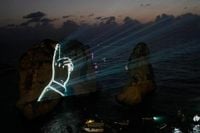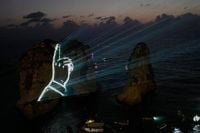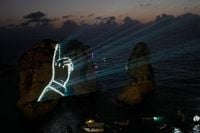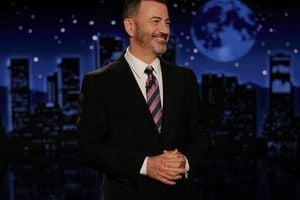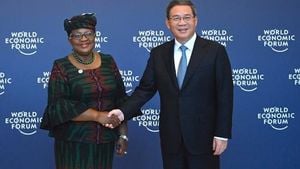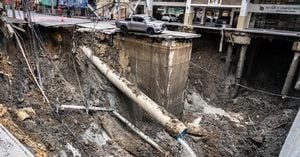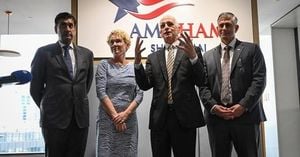Thousands of Hezbollah supporters gathered on Beirut’s coast Thursday, September 25, 2025, transforming the city’s iconic Raouche rock into a glowing canvas for the projected images of Hassan Nasrallah and Hashem Safieddine. The event, both a memorial and a political statement, commemorated the deaths of these two prominent Hezbollah leaders in Israeli airstrikes nearly a year ago. The spectacle, however, unfolded in open defiance of Lebanon’s Prime Minister Nawaf Salam, who had just days earlier attempted to halt such displays at national landmarks.
According to the Associated Press, the crowd assembled at a scenic overlook, their attention fixed on the illuminated natural arch rising from the Mediterranean. The images of Nasrallah—Hezbollah’s former longtime leader—and his successor Safieddine, both killed in successive Israeli strikes in late September and early October 2024, flickered across the limestone face. The gathering was unmistakably charged with emotion, pride, and a pointed message of resilience from a group battered by war and mounting domestic pressure.
Prime Minister Salam had issued a government circular earlier in the week, warning against what he described as "the recent recurrence of the exploitation of national monuments for propaganda purposes and to hold activities in which partisan and political slogans are raised." His directive was clear: public bodies were to "strictly prohibit the use of public land and sea areas, archaeological and tourist landmarks, or those that bear a unifying national symbolism before obtaining the necessary licenses and permits from the relevant authorities."
Despite these warnings, the event went ahead. Salam later clarified on X (formerly Twitter) that while the governor of Beirut had issued a gathering permit, it "clearly stipulated that the Raouche rocks shall not be illuminated at all, whether from land, sea, or air, and no light images shall be broadcast on them." In response to the breach, Salam said he asked the ministers of interior, justice, and defense to take "appropriate measures, including arresting the perpetrators and referring them for investigation," adding that the incident was "negatively impacting (Hezbollah’s) credibility in dealing with the logic of the state and its institutions."
A Hezbollah representative, speaking anonymously as per the group’s protocols, told reporters that the organizers had only requested permission for the gathering itself. The representative insisted that the light show was an expression of "freedom of expression" under Lebanon’s constitution, and that there was confusion over which government agency had authority to grant or deny permission for such displays on the Raouche rock. This ambiguity, he suggested, meant the group believed they were within their rights to proceed.
The event was more than a memorial—it was a show of force and defiance by Hezbollah, which has been under intense scrutiny and pressure since last year’s war with Israel. The group, both a Shiite militant organization and a powerful political party within Lebanon, suffered significant losses during the conflict. According to Reuters, the war began after the Hamas-led attack on southern Israel on October 7, 2023, which triggered the ongoing war in Gaza. Hezbollah joined the fray, firing rockets across the border in what it called a "support front" for Hamas and Palestinians in Gaza. Israel retaliated with airstrikes and artillery shelling, escalating what had been a simmering border conflict into a full-scale war in September 2024.
The fighting was devastating. Nasrallah was killed on September 27, 2024, in a series of massive Israeli strikes on a site in Beirut’s southern suburbs. The attack destroyed an entire block, beneath which Nasrallah was reportedly meeting with an Iranian general and several of his top military commanders. Days later, his successor Hashem Safieddine met the same fate in another round of airstrikes targeting the same area. The twin losses dealt a heavy blow to Hezbollah’s leadership and morale.
The war itself was short but brutal. It ended in November 2024 with a U.S.-brokered ceasefire, but not before leaving scars on both sides of the border. Israel has since continued near-daily airstrikes in Lebanon, which it claims are necessary to prevent Hezbollah from regrouping and rearming. The constant threat of renewed violence hangs over southern Lebanon, keeping tensions high and the population on edge.
In the aftermath, Lebanon’s government has faced mounting calls—both from within and from the international community—to disarm Hezbollah and consolidate all weapons under state control. Prime Minister Salam and his administration have publicly committed to this goal. Yet, as the BBC reports, Hezbollah officials remain adamant that they will not even discuss handing over their arsenal until Israel halts its airstrikes and withdraws from several key border points it currently occupies in southern Lebanon.
The standoff is fraught with risk. Lebanese officials are acutely aware that any attempt to forcibly disarm Hezbollah could ignite another civil conflict. The country’s army, already stretched thin and underfunded, is in no position to take on the powerful militant group without risking widespread violence. As a result, the government has adopted a cautious approach, hoping to avoid a direct confrontation that could plunge Lebanon into chaos.
Meanwhile, Hezbollah’s supporters see the group as a bulwark against Israeli aggression and a champion of Lebanese sovereignty. The light show at Raouche rock was as much a statement of defiance as it was a tribute to fallen leaders. "We will not be silenced," one attendee was overheard saying, echoing a sentiment widely shared among the crowd. The event’s organizers insisted that their actions were not only legal but also a necessary affirmation of their right to mourn and honor their leaders.
Yet critics, including many in Lebanon’s fractured political establishment, argue that such displays undermine national unity and the authority of the state. The use of national symbols for partisan purposes, they contend, risks deepening divisions in a country already struggling with economic collapse, political paralysis, and the lingering trauma of war.
For now, the incident has reignited debate over the balance between freedom of expression and the need for national cohesion. As investigations proceed and the government weighs its next steps, the question remains: how can Lebanon navigate the perilous path between honoring its many narratives and forging a unified future?
As the sun set over Beirut’s coastline, the illuminated Raouche rock stood as a powerful, if controversial, symbol—a reminder of the enduring struggle over Lebanon’s identity, sovereignty, and the uneasy peace that continues to elude the nation.
